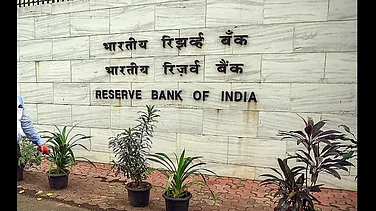Mumbai, Dec 2: The Monetary Policy Committee (MPC) of RBI began its three-day deliberation on Wednesday here amid expectations that the central bank will maintain status quo on the benchmark lending rates in view of high retail inflation.
The RBI will announce its monetary policy review on December 4.
After its last MPC meeting in October, RBI kept policy rates unchanged to help tame inflation that in recent times has surged past the 6 per cent mark. RBI projected the country's GDP to contract 9.5 per cent in the current financial year due to the pandemic. It has cut policy rates by 115 basis points since February.
Experts opined that RBI may not slash policy rates in the wake of rising Consumer Price Index (CPI)-based inflation driven mainly by supply side issues.
Amar Ambani, Senior President & Institutional Research Head at Yes Securities said with frequency indicators and GDP data conveying meaningful rebound in economic activity and retail inflation remaining stubbornly high, "we not only expect the RBI to maintain status quo in December 2020 policy meeting, but the minimal chance of a 25 bps rate cut in February 2021 also appears to be fading away".
He further said RBI may upgrade its growth outlook, wherein the central bank would scale down on its earlier pessimistic GDP projection of 9.5 per cent for 2020-21.
"Similarly, RBI will also update on the inflation trajectory, when compared with the earlier expectations of CPI moderating in Q4 FY21," he added.
Madan Sabnavis, Chief Economist, Care Ratings said the six-member MPC is expected to factor in its decision making the nascent signs of improvement in the domestic economy while also recognising the fragile nature of this recovery and the underlying downside risks.
"We expect the RBI to retain the policy rate at 4 per cent and continue with the accommodative policy stance despite the buildup in inflationary pressures," Sabnavis said.
On expectation from the RBI on policy rate front, Sachin Chhabra, founder, Peel-Works said active interventions by the government through stimulus measures and the central bank through the monetary policy have helped many segments of the economy to claw back to normalcy.
He further said the second quarter has seen strong indications of recovery. However, more needs to be done, especially in the MSME and SMEs sector, which is the engine of growth and employment.
"We expect an accommodative policy to continue along to set off the tremendous macro challenges that are head winding our nation," Chhabra said.
Jyoti Prakash Gadia, Managing Director, Resurgent India opined the RBI is expected to follow a 'wait and watch' approach while deciding about the repo rate this week.
With retail inflation at 7.61 per cent in October, the RBI stance is likely to be cautious, Gadia said, and added that fortunately in the second quarter, the decline in GDP was lower at 7.5 per cent than projected earlier.
"There is still uncertainty about the growth rate in the current quarter. RBI may therefore keep a close watch on the emerging inflation and growth numbers, before taking a view on the further rate cut... Continuation of a pause on the rate cut is thus expected to be the likely scenario," Gadia said.
Brickwork Ratings(BWR) in a report said that given the continued contraction of the economy, MPC is likely to continue with its accommodative monetary policy stance to manage financial stability and support growth recovery.
"Considering the elevated inflation levels, BWR expects the RBI MPC to adopt a cautious approach and hold the repo rate at 4 per cent in its December meeting," it said.
Retail inflation, calculated on the basis of CPI, continued to rise for the ninth month in a row in October, reaching 7.61 per cent on the back of high food prices. This is the highest level of retail inflation since May 2014 when the inflation was at 8.33 per cent.
The government has mandated the RBI to keep retail inflation at 4 per cent (+/- 2 per cent).































